Tsalenjikha, Georgian “island of freedom”: between hope and disappointment
Georgian opposition wins elections in Tsalenjikha
Tsalenjikha is a small municipality in Western Georgia. As a result of the local government elections in October 2021, it became a unique place. It is the only self-governing community out of 64 municipalities in Georgia where, as a result of the municipal elections, a representative of the opposition became the mayor.
Before that, since 2014, all the municipalities and cities of Georgia were governed by the ruling party of the oligarch Bidzina Ivanishvili – the Georgian Dream.
Tsalenjikha is located in the Samegrelo region, a few kilometers from the border with Abkhazia. This municipality is home to a little over 20,000 people, and it does not differ from other small regions of Georgia.
However, the result of the elections in Tsalenjikha caused a great resonance throughout the country. Tsalenjikha became the subject of memes and jokes on social media. Many wrote that they were moving to Tsalenjikha to live in search of freedom, some began to look for Tsalenjikha roots or ask how to get the ‘Tsalenjikha green card’.
There were also those who seriously thought about buying land or a house there and some influential entrepreneurs have even announced that they are ready to invest in Tsalenjikha.
The opposition believes that Tsalenjikha should become the forefront of the political life in Georgia and an example for other regions.
JAMnews visited this small town to see how people live there, why it suddenly turned out to be so special on the country’s electoral map and what its chances for development are.
End of December, the weather is cold and rainy. We are traveling to Tsalenjikha from the city of Zugdidi.
The road is old, broken, full of potholes. On both sides of the road there are beautiful large Megrelian houses with well-groomed courtyards.
After a while, a good road, recently paved with dark asphalt, begins. We enter Tsalenjikha. In the center of the city, there is a large Christmas tree decorated with red ribbons.
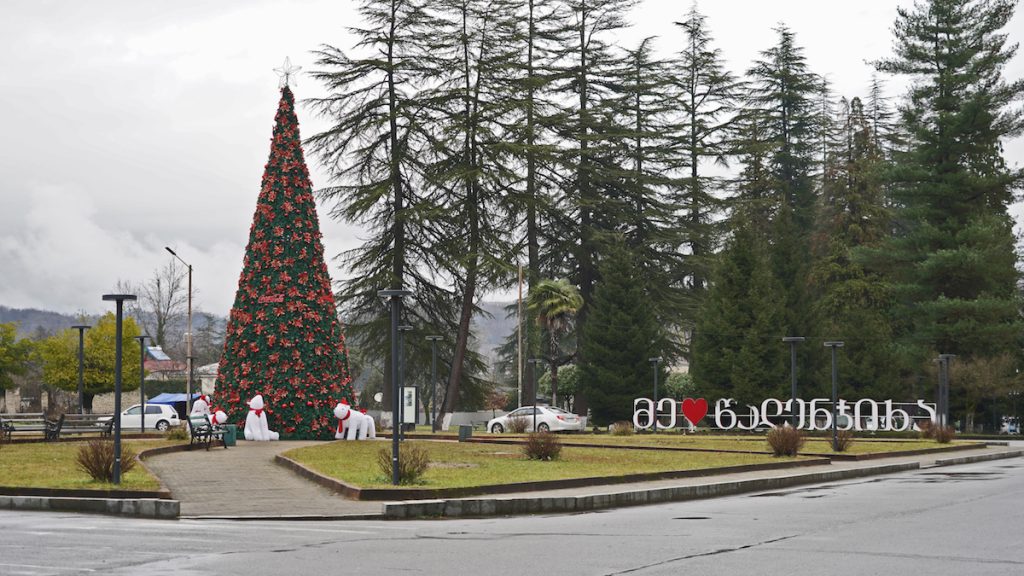
“This is a gift from the Coca-Cola Company. A few days ago it was officially lit”, says local resident Beka Chachibaya, who met us in the center of Tsalenjikha.
Beka is 36 years old. He worked in Poland for several years. He says that the working conditions there were very difficult, he could not stand it and returned.
Many left Tsalenjikha for Europe.
“Young guys mainly go to Poland, and sometimes to Germany and Turkey, but seasonally – more often in the summer months, when there is some need for physical work. They go for three months, and then they think of staying there”, says Irakli Kharchilava, an authorized representative of the newly elected mayor of Tsalenjikha in the town of Jvari power engineers, also belonging to the Tsalenjikha municipality.
There is no nepotism there. Irakli and the new mayor, Giorgi Kharchilava, are not relatives, just namesakes.
“Why did the majority vote for the opposition here?”, I ask the newly appointed non-party commissioner. He says that Tsalenjikha has always been in opposition. But to this were added several more factors: the indifference of the government to the region and extreme poverty.
Tsalenjikha residents also say that in these elections, the authorities colluded with shady people and tried to influence voters through them – by means of pressure, bribery and intimidation. This was followed by an opposite reaction.
“It seemed as if our region was erased from the map of Georgia, as if it did not exist. People saw it sinking into a swamp, and it seemed there was no way out. They realized that changes were needed”, says local resident Levan Belkania.
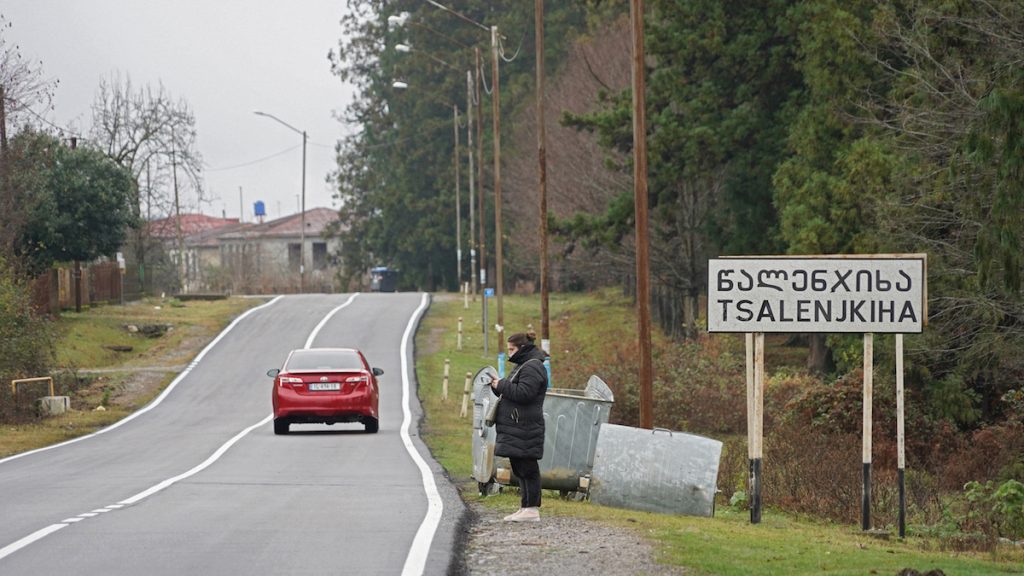
The source of income for the inhabitants of Tsalenjikha is either the cultivation of hazelnuts and blueberries, or trade. There is no other job here besides local government, schools and kindergartens.
The dam of the Inguri hydroelectric power station, the largest in Georgia, located in Tsalenjikha municipality, provides work for a small number of people.
Maya Gabedava has a small stall where she sells all kinds of trinkets and accessories at the Tsalenjikha market.
“I have two stores, but I don’t earn enough. There are eight of us in the family, everyone needs food. Children help me, one is in Italy, the other one is in Russia. There is only trade, people have no other source of income here”, she says.
- Poti – the ‘poor rich’ city of Georgia
- Anaklia: Georgia’s forgotten Black Sea resort
- Freedom House Georgia 2021 report: politicized courts, media pressure, corruption in focus
“We won despite the falsifications”
The new mayor, Giorgi Kharchilava, is a member of the largest opposition party, United National Movement. The leader and creator of this party is the former president Mikheil Saakashvili , who returned to Georgia from Ukraine just before the local elections and was immediately arrested.
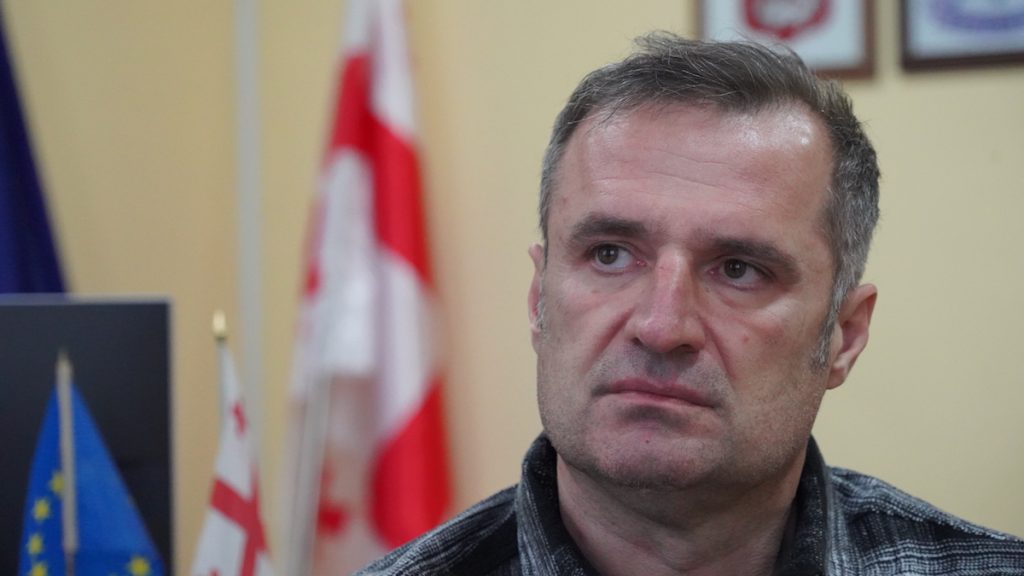
Before these elections, no one knew Kharchilava outside of his native region, but today he is famous throughout Georgia – he is a frequent guest on talk shows of national TV channels.
It’s raining on this Monday morning. The courtyard of the Tsalenjikha mayor’s office is packed with cars.
The City Hall is an old Soviet-built building, filled with the smell of kerosene. The reception area is full of people, everyone wants to see the mayor – mostly to ask for help.
The day before, in the villages of Tsalenjikha, the rain washed out the roads, and fires broke out in some places. The mayor says he has a lot of work to do today – listening to visitors, inspecting the damaged road and visiting families affected by the fires.
The Mayor is clearly uncomfortable sitting in the middle of a large office. Flags of Georgia and the European Union stand behind his massive table.
51-year-old Giorgi Kharchilava is a local resident who was born and raised in Tsalenjikha. He has a wife and three children.
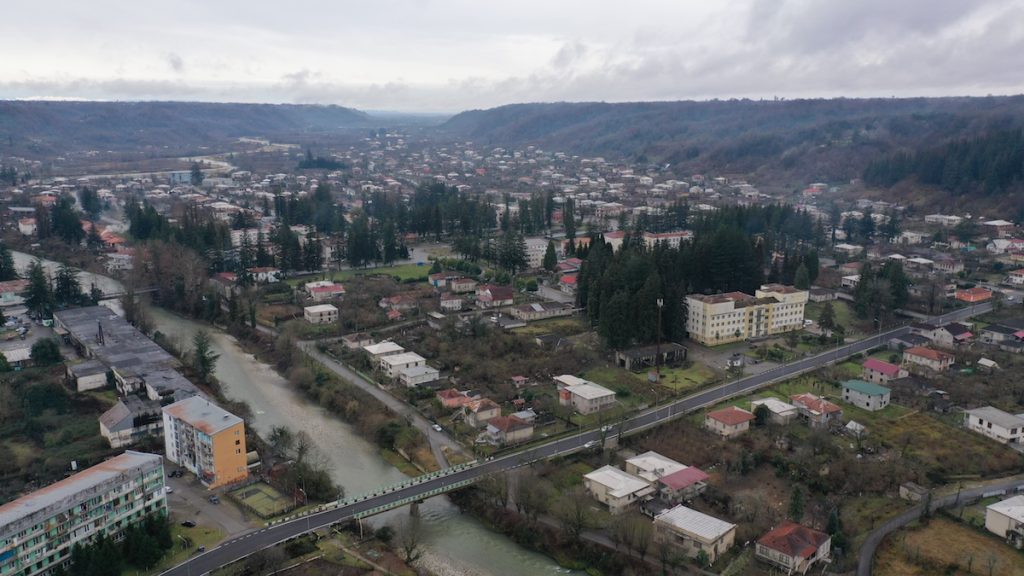
These are not his first steps in politics. Once, during the previous government, he served as the chairman of the Tsalenjikha Sakrebulo – local council.
His main rival in the mayoral elections in 2021 was the ruling party’s candidate Goga Gulordava. In the first round, he was ahead of his rival by 207 votes, and in the second – by 311. Kharchilava won 51.09% of the vote, and Gulordava – 48.9%.
Kharchilava says that in Tsalendzhikha, the authorities used all methods of pressure on voters – intimidation, bribery, falsifications:
“Before the elections, four majoritarian [in single-mandate constituencies – JAMnews] opposition candidates withdrew their candidacies [under pressure from the authorities], all four were teachers. This is how this system works. The elections were rigged here as well, but there is a limit to rigging, and we have crossed this limit. If not for this falsification, we would have taken 70%”.
“How did you win the elections?”, I ask the mayor.
“Tsalenjikha has a historical context and this context repeats itself over time. In the 90s, a national movement began from here, in 2003 – the Rose Revolution. Then came the years of reform. People’s critical attitude towards the authorities has never softened. Especially now, when everyone understands that we are actually fighting with our northern neighbor.
My biography from a young age is inseparable from this city – working in the education system, playing sports”, says Kharchilava.
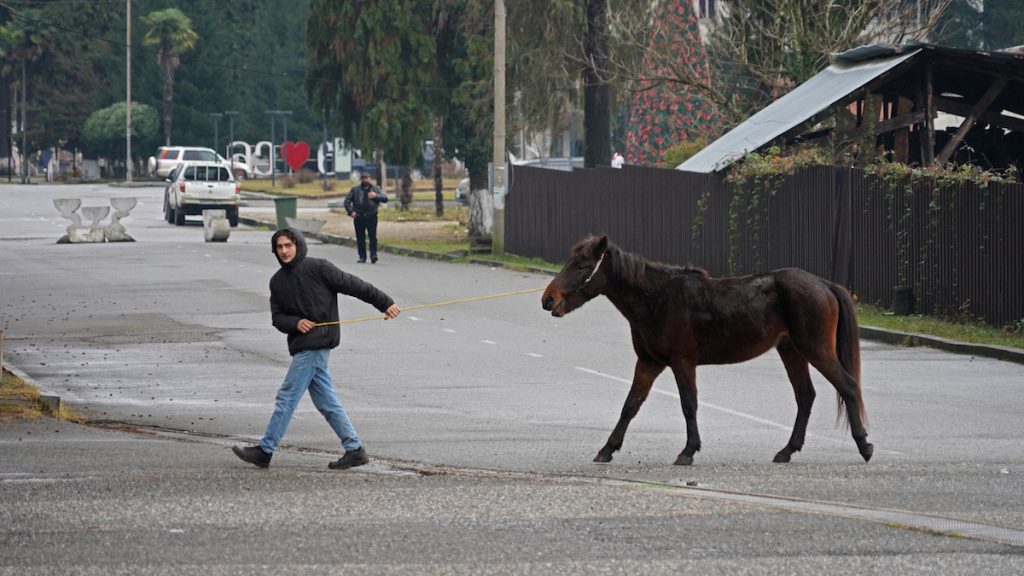
The first crisis
Two months after the elections in Tsalenjikha, the “change” that has been expected by those living in the Georgian capital is not noticeable. The euphoria and emotions from the victory of the opposition are clearly gone.
Many locals avoid having frank conversations in front of the camera. In private conversations, some say that although they supported the opposition, they “do not want problems”, and no longer speak publicly.
It is said here that the future of the opposition in Tsalenjikha has again become vague, and “who will be the boss tomorrow” is unknown.
The first crisis is already evident – the deputies of the newly elected Sakrebulo have not been able to elect a chairman. On January 23rd, the fourth attempt to do so failed.
In the Tsalenjikha sakrebulo, where there are 27 deputies, none of the parties has a majority. 11 deputies were elected from the ruling Georgian Dream party, the same number from the United National Movement. Three – from the party of the former Prime Minister Giorgi Gakharia For Georgia. One deputy is from the opposition Lelo party and one is independent (former member of the Gakharia party).
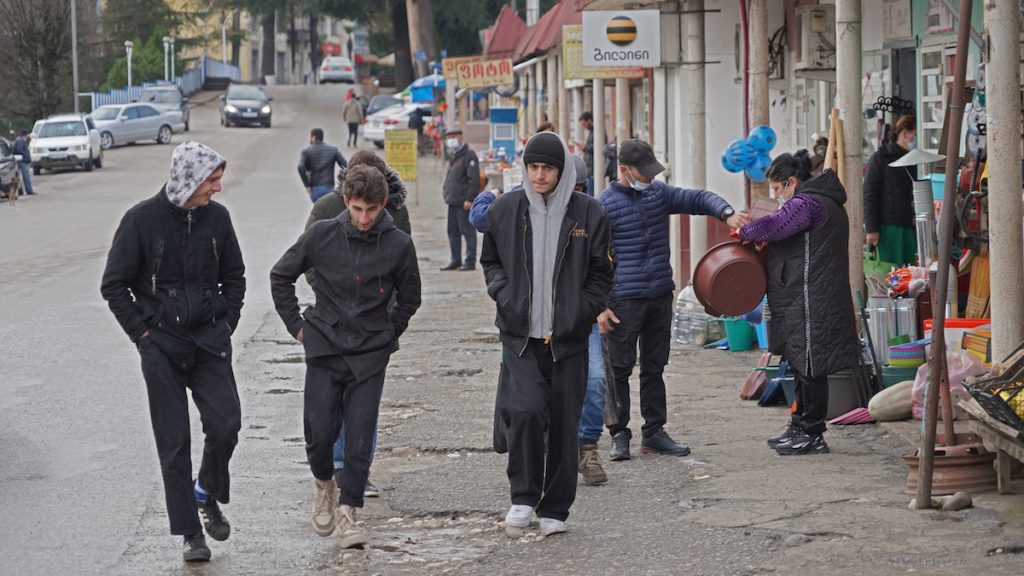
In fact, the balance of power is equal – in the council there are 12 opposition members (11 from UNM + 1 from Lelo, who act as a united front) and 12 pro-government deputies (Georgian Dream + 1 independent deputy). Consequently, the votes of three deputies from the Gakharia party became decisive.
The party of Gakharia, the ex-prime minister of the Georgian Dream government, who scandalously resigned in early 2021, based its election program on the fact that it distanced itself from both Georgian Dream and the UNM.
The UNM invites the Gakharia party to nominate its candidate for the post of chairman of the Sakrebulo. But it has not yet been possible to reach an agreement and vote.
Irakli Kharchilava is convinced that the authorities are artificially dragging out the process, because the authorities do not want to cede this municipality to the opposition and are trying to call re-elections there.
- What the flamingos in Ivanishvili’s dendrological park say about Georgia
- The oligarch’s hometown – the founding legend of the Georgian Dream
- Centuries old trees – the billionaire’s latest temptation
“The authorities cannot come to terms with what happened here. Since Tsalenjikha is a place of victory for us and a motivator for other municipalities, it is a factor of fear for the Georgian Dream – a place where changes can begin”, Kharchilava said.
Whoever was behind this, the fact remains – in the municipality, which was supposed to become almost the main political center of the country, the processes are frozen – the local council cannot even adopt its budget for 2022.
The opposition in the capital seems to have forgotten about Tsalenjikha – the city disappeared from the political agenda and media. The main opposition party is now focused on demanding the release of imprisoned Mikhail Saakashvili.
“The process is not moving forward, local councils cannot move on to discuss other issues. In each case, this could trigger a municipal crisis, and this will primarily hit the idea of consensus-based governance”, says Vakhushti Menabde, director of the Democratic Institutions Support Program of the Georgian Young Lawyers’ Association.
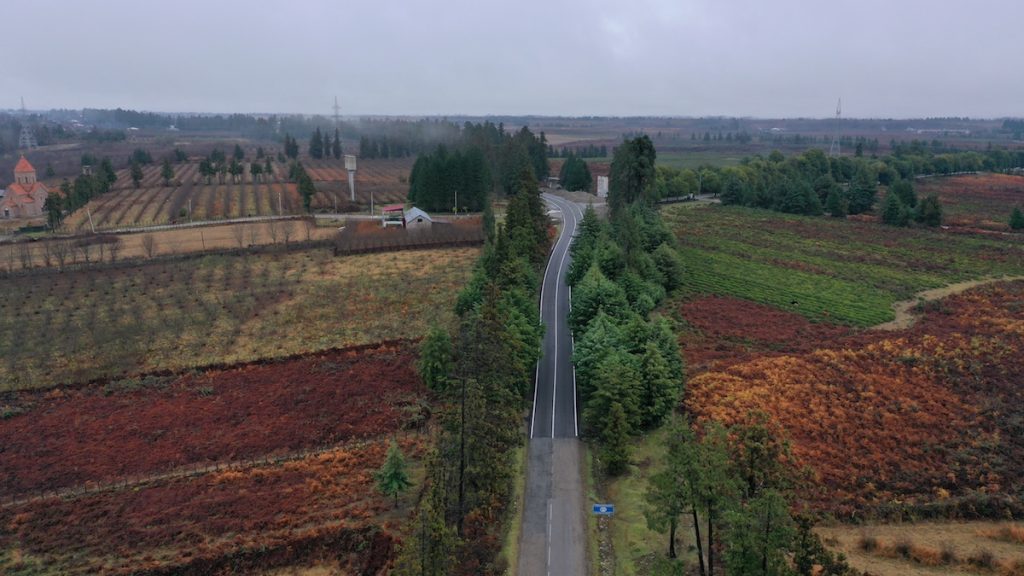
Irakli Melashvili, a self-government expert, tells us that if the crisis continues and the budget is not approved within three months, the government will call early elections in Tsalenjikha:
“I doubt that this will be a beneficial option for the opposition, even for Gakharia”, Melashvili said.
According to him, the solution to the problem is negotiations and the European model of local councils, when positions are distributed in accordance with the votes received:
“Not one winning party gets all the mandates, but they are distributed depending on who received what percentage. If someone, for example, gets 30% of the vote, they get a third of the posts. These officials then compete with each other to show the public who is doing their job better. But this does not happen in Georgian politics”.
“What concessions are you ready to make to get out of the crisis?”, I ask the mayor of Tsalenjikha.
“When three out of 11 deputies are offered to nominate a candidate for chairperson – isn’t this already a concession?! Georgian Dream is trying to re-register the lost elections, it has ambitions to appoint a chairman in the Sakrebulo and get a majority in the commissions. Why, I ask? By what right?”, says Giorgi Kharchilava.
Tsalenjikha’s friends club and chances for development
Giorgi Kharchilava wastes no time waiting for the crisis in the Sakrebulo to be overcome. He often visits the capital and meets with people who are ready to contribute to the development of Tsalenjikha.
Kharchilava unites these people into a “club of friends”. The list is already impressive.
The Eastern European Center for Multi-Party Democracy (EECMD) has already opened a new office in Tsalenjikha – Democracy Hub.
The organization will work on political education of local residents and increasing the effectiveness of self-government.
Educational and cultural events in Tsalendzhikha will be financed by the Formula TV company. The TV channel plans to open a media center for young people, print drawings by the famous poet Terenty Graneli for his museum and reconstruct a stadium in the city of Jvari.
In addition, the Coca-Cola Bottlers Georgia Company will take over the patronage of the stadium. Tsalenjikha has already received the first gift from the company in the form of a new Christmas tree.
In Tsalenjikha, the founder of TBC Bank, one of the most influential bankers and one of the leaders of the opposition Lelo party, Mamuka Khazaradze, also has plans of his own – immediately after the election results were announced, he announced that he would buy a house in Tsalenjikha.
In addition to attracting investors, Giorgi Kharchilava plans to put Tsalenjikha on the tourist map of Georgia. The locals also speak about this potential of the region.
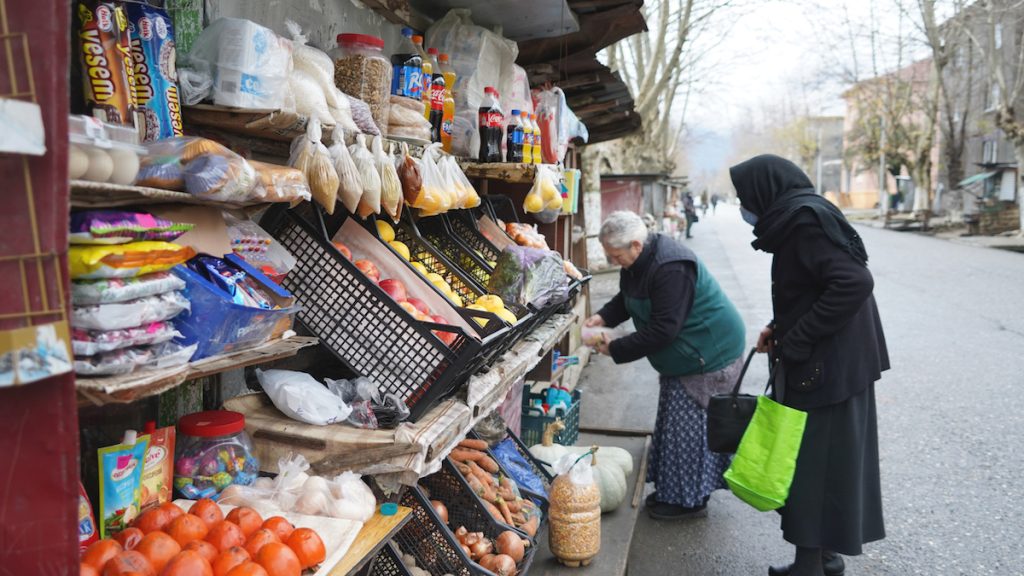
“Thousands of people drive through the town of Jvari every day in the summer and head to Mestia [the popular tourist destination in Svaneti], so many of them do not spend a cent here. This is due to the fact that in Tsalenjikha there are no basic conditions, no roads for tourists to get to any sights”, says local resident Levan Gobechia.
Levan lives in the city of Jvari and runs a travel agency. He says the municipality has the potential to develop cycling and culinary tourism, as well as to become a popular rafting destination.
In his opinion, in addition to improving infrastructure, the government should offer favorable conditions for the tourism sector to develop and provide security guarantees.
“Tsalenjikha is now in the spotlight. Now we have the opportunity to use this and promote tourism”, says a resident of Tsalenjikha Levan Kvaratskhelia.
One of the most famous alpine lakes in Georgia, Tobavarchkhili, is located in the region. Despite its inaccessibility, thousands of people visit it every year. Tsalenjikha residents believe that they should be able to use these opportunities.
The Tsalenjikha factor – the path to the success of the Georgian opposition?
Taking into account the political situation and the permanent political crisis in Georgia, Tsalenjikha should become the main place of political struggle for both the authorities and the opposition, experts say.
“The central government is interested in the opposition mayor of Tsalenjikha not living up to expectations, so this government will create problems for him. This is a test for the opposition – it must show that it is not just a protest force, but that it is a force capable of constructive governance”, says political scientist Gia Nodia.
In his opinion, now the opposition mayor of Tsalenjikha needs support:
“At the very least, any violations or persecution against him should be the focus of attention. Naturally, the United National Movement, which is represented by the mayor, should be the first to do this and all political opposition forces are interested in this”.
However, the opposition forces do not show this interest. Tsalenjikha disappeared from their agenda. For almost three weeks, JAMnews tried to find out from the United National Movement what the party’s plans were in Tsalenjikha, but to no avail.
Some opposition parties have told us directly that they do not want to talk about it.
Meanwhile, the opposition began a mass hunger strike demanding the release of Saakashvili, and they considered our persistent attempts to talk about Tsalenjikha inappropriate.
“The opposition has moved away from real life, this is a fact. Now the main front line for them runs through the presence of Mikhail Saakashvili in prison or at large. They have long forgotten Tsalenjikha. Our opposition is very fond of promises, but it is too lazy to implement them”, political observer Gia Khukhashvili told us.
We asked Boris Kurua from the Girchi – More Freedom party, who turned out to be the only opposition politician who willingly agreed to comment on this question: “Does the opposition have any strategy on Tsalenjikha?”
He confirmed to us that now this issue is not on the agenda. Kurua does not expect “ground-breaking changes” in Tsalenjikha. “But we can show that cooperation (between opposition parties) is working”, he says, adding that it would be good for the opposition to create an advisory body to help the mayor.
In the last elections, the opposition focused on the model of a coalition government.
Giorgi Kharchilava has two deputies – the first, Lasha Zarkua, is a non-partisan and the second, Tamar Belkania, is a member of the Lelo party. In the first round of elections, Belkania was the rival of Kharchilava and received 3% of the vote.
Now the opposition must show that this model works, and then use this model throughout Georgia.
“If they do not succeed in Tsalenjikha, it will be a great disappointment for voters and the beginning of the collapse of the opposition”, expert Gia Khukhashvili said.
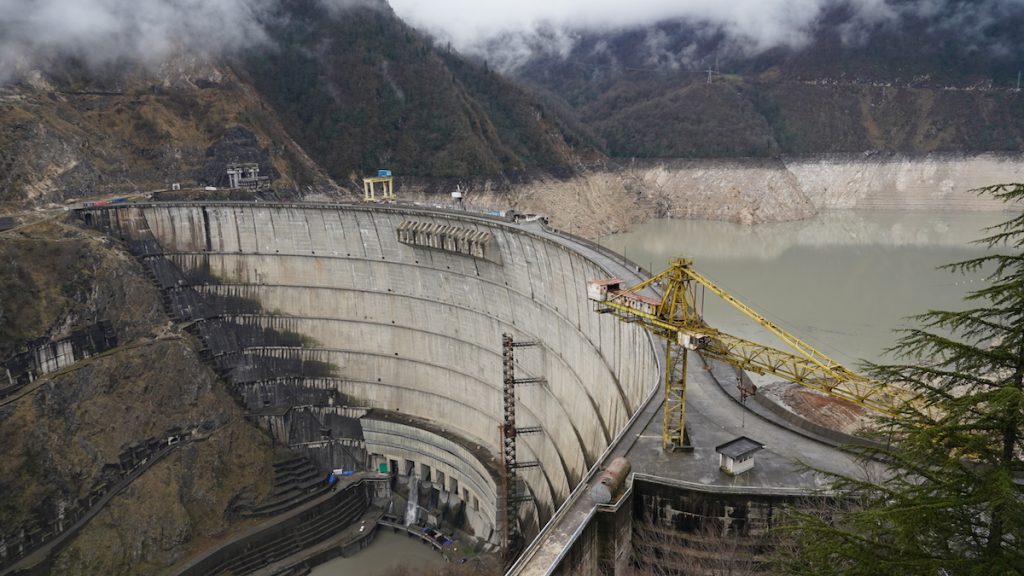
Is there hope for Tsalenjikha?
“You are the only municipality that has elected an opposition mayor. Now all attention is focused on Tsalenjikha, what are your expectations?”, I ask Marina Alasania from Tsalenjikha.
“If this mayor stays, something will work out, yes. He is a good energetic guy and he will do something for people. I believe in it, I don’t know about others”, she replies.
“If people stand next to the mayor and he is given the power ‘from above’, everything will work out”, says Maya Gabedava.
The mayor has already been told ‘from above’ that he cannot do anything without the help of the government.
“Before the elections, Prime Minister Garibashvili actually threatened voters saying that if they elect an opposition mayor and he misbehaves, he will not be able to do anything. The rhetoric after the results seemed to soften, but the problem remained. A mayor from the opposition should not expect good treatment from the government, because the government perceives him as a political threat”, says Gia Nodia.
“We did not run in elections for the sake of an easy life. We knew where we were going”, says Giorgi Kharchilava, but not in such a confident tone as he spoke about investments or Tsalenjikha’s friends.
Irakli Melashvili looks at this issue more pragmatically. According to him, with the current self-government code, the mayor of Tsalenjikha will not be able to increase the budget:
“His budget depends on the central budget, he cannot increase it. Even if Elon Musk builds a plant in Tsalenjikha, the local budget will receive little [because VAT and income tax go to the central budget – JAMnews]. Therefore, the opposition’s enthusiastic statements sound like demagoguery”.
Therefore, according to him, the mayor of Tsalenjikha should set an example of good governance “and maximum involvement of citizens in the work of self-government. The mayor can do a lot of good in this regard and set a good example for other municipalities”.
Gia Nodia fears that it will be difficult for the mayor of Tsalenjikha to achieve concrete results:
“Yes, we view Tsalenjikha’s model as a precedent for democracy, but ordinary people do not look at it that way, they expect results that will affect their lives. In this sense, it is difficult for the opposition mayor, who is fighting the central government, to achieve any results”.
Locals feel it too:
“The enthusiasm among the people has faded, but this is normal, people make demands and expect a quick result, and very little time has passed since the elections”, says local resident Levan Kvaratskhelia.
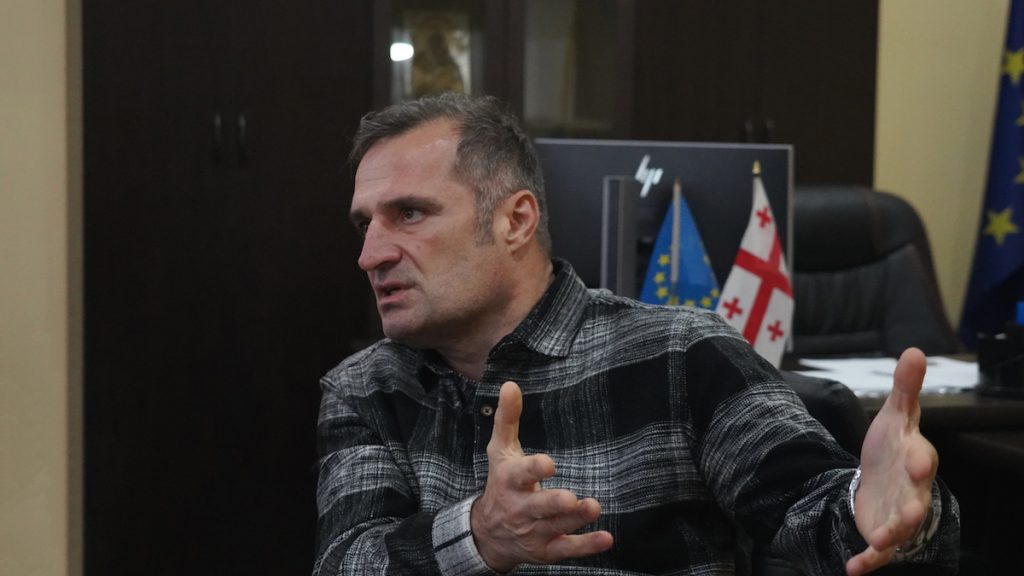
Nihilism has already permeated the mood of the people. “What do you think will happen to the opposition mayor of Tsalenjikha, who has taken on such a big burden?”, I ask Giorgi Kharchilava.
The mayor suddenly becomes sad, asks several times why people seem disappointed to me, and, after thinking, answers:
“It was impossible to imagine such a thing before the elections – that there would be such a result, and we would have to correspond to this reality. But behind this choice are such people, such faithful people, who have gone through such hard years, that I have no other choice.
I have to do more than I can. The first coalition model is formed and it must be justified in order to then become an example for others.
That’s why everything will work out!”
Supported by RLNE


















